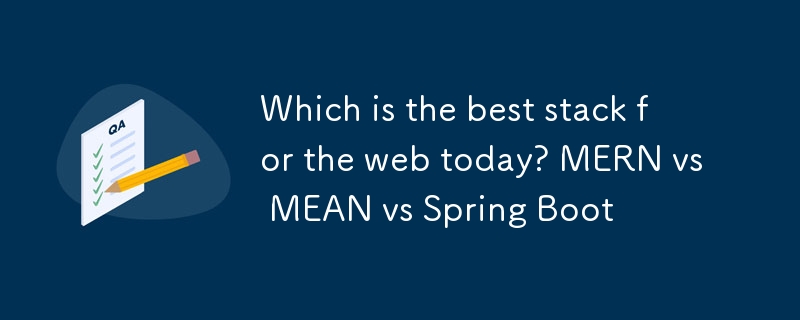

Many devs nowadays have a common question in their mind, which web frameworks and stacks are best to make a career? Well the question itself is unanswerable looking at the circumstances today. However, I will try to provide the best answer based on my experience and current market trends.
Let's consider the three most used and popular stacks in the market today which are MERN, MEAN and Spring. All three of these stacks come with unique functionalities and applications fulfilling different use cases. If we look at MERN Or MEAN, They are more likely to be used for complete dynamic web application development while on the other hand, spring boot is suited for microservices and loosely coupled REST API-based enterprise applications.
MERN and MEAN use javascript which makes it easy to write but still allows us to use it with modern features like NoSQL datasets, Caching etc. Similarly, Spring boot uses Java which is a language that is part of most of the legacy applications. Spring Boot makes a powerful framework that allows us to develop loosely coupled and serverless architectures. Looking at other features all stacks allow support for REST APIs, Scalability, and Fault tolerance by integrating with the cloud.
key features of MEAN, MERN, and Spring Boot:
|
MEAN Stack |
MERN Stack |
Spring Boot | ||||||||||||||||||||||||||||||||||||||||||||||||
|---|---|---|---|---|---|---|---|---|---|---|---|---|---|---|---|---|---|---|---|---|---|---|---|---|---|---|---|---|---|---|---|---|---|---|---|---|---|---|---|---|---|---|---|---|---|---|---|---|---|---|---|
| Database | MongoDB (NoSQL) | MongoDB (NoSQL) | SQL/NoSQL Databases | ||||||||||||||||||||||||||||||||||||||||||||||||
| Server-Side Framework | Express.js | Express.js | Spring Framework | ||||||||||||||||||||||||||||||||||||||||||||||||
| Development Paradigm | Full-Stack JavaScript, Single Page Application (SPA) | Full-Stack JavaScript, Component-Based Architecture | Enterprise-Level Application, Microservices Architecture | ||||||||||||||||||||||||||||||||||||||||||||||||
| Auto-Configuration | No | No | Yes | ||||||||||||||||||||||||||||||||||||||||||||||||
| Embedded Servers | No | No | Yes (e.g., Tomcat, Jetty, Undertow) | ||||||||||||||||||||||||||||||||||||||||||||||||
| Microservices Support | Limited, typically not the primary focus | Limited, typically not the primary focus | Strong support for microservices | ||||||||||||||||||||||||||||||||||||||||||||||||
| Production-Ready Features | Depends on configuration | Depends on configuration | Yes, includes metrics, health checks, etc. | ||||||||||||||||||||||||||||||||||||||||||||||||
| Security | Depends on additional libraries | Depends on additional libraries | Built-in with Spring Security | ||||||||||||||||||||||||||||||||||||||||||||||||
| Scalability | MongoDB provides scalability for data | MongoDB provides scalability for data | High scalability, especially in microservices architecture | ||||||||||||||||||||||||||||||||||||||||||||||||
| Ecosystem | Angular ecosystem for front-end | React ecosystem for front-end | Comprehensive Spring ecosystem, including Spring Cloud, Spring Data, etc. | ||||||||||||||||||||||||||||||||||||||||||||||||
| Development Speed | Fast due to full-stack JavaScript and easy to understand | Fast due to full-stack JavaScript and easy to understand | Fast with Spring Boot’s auto-configuration and Spring Initializr but little bit complicated |
The above is the detailed content of Which is the best stack for the web today? MERN vs MEAN vs Spring Boot. For more information, please follow other related articles on the PHP Chinese website!




